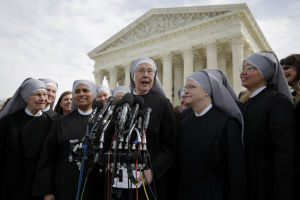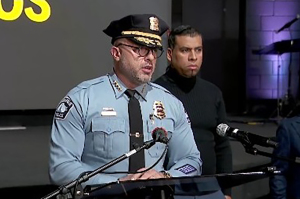Minnesota Shutdown: Political Fireworks Display Instead
Lawmakers fail in budget talks
Hundreds of “closed” signs posted on the gates of Minnesota's state parks, campgrounds, public recreation sites, and permit offices are a stark reminder this holiday weekend that the state government is in shut down.
Instead of fireworks, picnics, and celebrations this weekend, most of the five million residents of Minnesota will remember this Fourth of July as somber, reflective, and disappointing.
Minnesota’s Democratic Governor Mark Dayton blames the Republican majorities in both legislative bodies, and the GOP majorities blame the governor for the failure to reach a budget deal before this week’s deadline.
Budget talks fell apart late Thursday, closing off major family sites, costing taxpayers their holiday fun and forcing thousands of state worker layoffs.
The budget impasse furloughs about 23,000 of the roughly 36,000 Minnesota state employees.
State funding ran out on July 1, forcing all but the most critical state government functions to shut down indefinitely including websites, permit offices, highway rest stops, the state lottery, and state-funded tourist sites.
Despite hours of intense negotiations, the Republican legislative caucuses remain adamantly opposed to any additional tax revenue ultimately ending in a stalemate and moving lawmakers farther away from a budget deal.
Republicans offered to forego a $200 million tax cut but that is only a small step toward resolving the state’s $5 billion deficit.
Dayton fired back at lawmakers saying “instead of taxing their friends, they would prefer very damaging cuts to health care, K-12 and higher education, state and local public safety, mass transit, and other essential services.”
Republicans negotiated to raise $1 billion of revenue by shifting schools payments and issuing bonds for tobacco settlement money. Dayton offered to limit a proposed income tax increase to residents earning more than $1 million per year. None of the offers stuck.
Minnesota, the "Land of 10,000 Lakes," is well known for its outstanding destination sites, scenic drives, and outdoor recreation for the family but the economic pressures this week will affect the state for years to come, according to political analysts.
"Tax revenues are still in my view the fairest way to resolve this," Dayton said.
Roger Nichols, a longtime resident of St. Paul, Minn., said the government shutdown caused him to change family plans for the holiday weekend.
“I found out the golf course is closed and I cannot get a fishing license for me and my son,” Nichols told The Christian Post.
“The parks and sites are really closed. Parts of this area look like a ghost town compared to what it usually looks like this time of year with all of the tourists. The government should not raise our taxes every time they cannot figure out the budget. We decided to take the family to Florida –I know they are open.”
A spokesperson for the state’s Department of Natural Resources told The Christian Post that there will be a skeleton crew on hand for emergency services until at least Tuesday.
Minnesota is no stranger to political disagreements and financial woes. The state lost 80,800 jobs before employers added 29,300 positions in 2010. In the 12-month period between May 2010 and May 2011, the state was on the upswing and added 15,200 workers to the payroll.
This week's sudden number of furloughed state workers will shove the unemployment rolls above 221,000 just at a time when the state's economic recovery was gaining momentum.
“I deeply regret that the last week of intense negotiations between the Republican legislative leaders and Senator Bakk, Rep. Thissen, and myself have failed to bridge the divide between us,” Dayton said in a statement.
“It is significant that this shutdown will begin on the Fourth of July weekend. On that date, we celebrate our independence. It also reminds us that there are causes and principles worth struggling for – worth even suffering temporary hardships to achieve.”
The recession and recent state budget constraints have threatened to extinguish many of Minnesota's fireworks shows. Many were canceled altogether, including the popular Fourth of July fireworks in Maplewood and city festival fireworks shows in places like Mora and St. Paul Park.
However, local businesses, private organizations, and donors stepped up to the plate at the last minute to save a few fireworks shows around the state.
For a city of 8,000, Stewartville in southeastern Minnesota is proud of its annual fireworks show. People come from bigger cities like Rochester and the Twin Cities and pack an area near the Root River where the fireworks are shot into the air. City leaders decided that the show must go on and will keep the fireworks show on the schedule with a few modifications to keep the cost down.
The city of Virginia was about to eliminate the $7,500 it usually puts toward its fireworks display, but there were a lot of complaints. The city council gave in and decided to hold the show of fireworks.
"We said, let's be patriotic," city operations director John Tourville said in a recent interview.
City leaders in Moorhead are trying to get the word out that despite the government shutdown, its Fourth of July festivities will also continue.
In Marshall, the budget for the city's fireworks show was drastically reduced this year as city leaders agreed to put forth only $2,500 instead of the $12,000 or $13,000 it usually spends, said Doug Goodmund, assistant director of Marshall Community Services.
City officials knew there was a possibility they would have to cancel the whole event, including the tradition of giving away 500 kites for the children to fly in the park. But local businesses came through with sponsorship money, and the show will go on this year.
The fact that the nation's Congressional leaders agreed at the last minute in April to a compromise that kept the federal government funded for the remainder of the fiscal year remains fresh in the minds of Minnesotans. The move averted a shutdown less than an hour before it was set to start.
Republican leaders had asked Dayton to call a special session to approve a temporary extension of funding for ten days while the budget negotiations were completed, saying that they believed they were close to a budget deal, according to state records.
However, Dayton told fellow lawmakers that he thought the idea was "a publicity stunt."
“This governor has chosen maximum pain - maximum pain for political gain,” said Senate Deputy Majority Leader Geoff Michel (R-Edina).
Prison staffing, state police patrols and staffing at nursing and veteran’s homes are some of the services determined by lawmakers as "critical" and will stay in operation. Staffing at numerous other departments will be cut to the bare bones.
The Minnesota Zoo is also closed, with spending permitted only to feed and care for the animals.
The government shutdown will continue indefinitely – or until lawmakers can come to an agreement on the budget.
Neither Dayton nor the leaders gave any indication of when budget talks might resume.
On the web: BeReadymn.com.



























